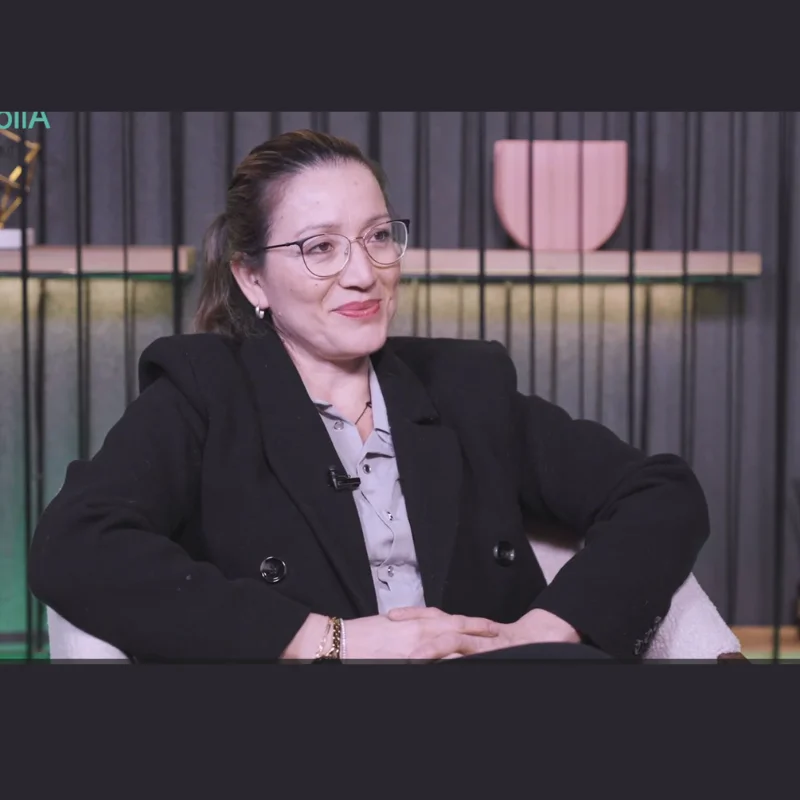Dr. Renata Valdes is an internal medicine specialist at the renowned King Abdulaziz Medical City in Riyadh, part of Saudi Arabia’s government sector, the Ministry of National Guard Health Affairs (MNGHA). Prior to relocating to Saudi Arabia in September 2024, Dr. Renata was an internal medicine specialist at Plymouth University Hospitals NHS Trust for six years. She brings a wealth of skills and experience in the diagnosis and treatment of a wide range of medical disorders, including managing patients with complex comorbidities while working in multidisciplinary teams. Dr. Renata holds a Master of Science in Medicine from Universidad San Jorge in Spain and a bachelor’s degree in medicine from Escuela Latinoamericana de Medicina. She has also completed a certificate course in cardiometabolic health from the Cardiometabolic Health Congress.
The Ministry of National Guard Health Affairs’ 1051-bed capacity King Abdulaziz Medical City complex, in the east of the city of Riyadh, is one of the largest and most comprehensive healthcare medical cities in the region. The Medical City complex includes the former King Fahad National Guard Hospital and many newer medical units and centers of excellence, including the King Abdulaziz Cardiac Center, Organ Transplant Center, and Liver Center, as well as other departments and specialized services, all fully equipped with highly sophisticated technology. The King Abdullah Specialized Children’s Hospital (KASCH) and Women’s Health Hospital (WHH) are located on the same site. King Abdulaziz Medical City is known for providing care to the highest international standards, as well as being a pioneer in introducing new treatments to the region.
Dr. Renata Valdes is one of the first doctors that Allocation Assist has helped relocate to work in Riyadh, Saudi Arabia. We were excited to find out about her experiences since moving to Riyadh.
It’s great to see you, Dr. Renata. Can you start by telling us about your training and experience?
It’s great to see you too. It’s a pleasure for me to share my experience with you. I’m an internal medical consultant with nearly ten years of experience. I did my specialty training in Spain and Tenerife, which is part of the Canary Islands. Before coming to Saudi Arabia, I was working in England for about six years at Plymouth University Hospitals NHS Trust.
How did you make the decision to relocate to Saudi Arabia?
I was attracted to the good working conditions that Saudi Arabia offers to doctors. Also, the city of Riyadh is an amazing place. It is huge, with a lot of different cultures. All of that attracted me, and I was ready for a new challenge. I found that Riyadh offers a good environment for my family. So, when I was weighing everything up, I decided that Riyadh offered a lot of benefits, both professional and personal.
How would you describe your experience working at the National Guard Hospital in King Abdulaziz Medical City in Riyadh?
It’s a huge hospital complex, managing a very large number of patients every day. The hospital facilities are first-class. Having worked in different hospitals in different countries, I can say that all the different hospital protocols and guidelines are consistent with international and European standards.
Can you tell us more about your initial experiences settling into working at the Ministry of National Guard Health Affairs hospital?
When I first arrived, I was a little bit afraid of how I would get on with new colleagues coming from different cultural backgrounds. There are always new challenges when moving to a new country.
But actually, I was made to feel very welcome. Everyone was very, very friendly and helpful. My colleagues helped me to know what steps I needed to follow and what things I needed to do.
The shadowing or induction period that I had was very good and easy, because my colleagues really helped me settle in.
How is the hospital provided with accommodation and other amenities where you live?
I have my own apartment within the hospital’s housing compound. Each employee is provided with spacious accommodation according to their family size. The facilities are really good; we have a gym, swimming pools, cafes, and restaurants, all nearby. It is nice, peaceful, quiet, and also pet-friendly. And all this is provided in the contract, so it’s amazing!
Can you tell us about social interactions within the community?
The community is really nice and friendly. We have a community WhatsApp group – where we share information and experiences – sometimes also complaints – but not too many. There is a friendly culture where everybody helps each other out, so it is easy to make friends.
How is living in Riyadh City?
I have been here just six months so far, so I haven’t been able to explore the whole city yet. It is really huge, with a lot of traffic too! Riyadh is a first-class, modern, and cosmopolitan city. It has everything here that you would expect from a big international city.
Have you had a chance to visit Riyadh Season?
Yes, I went to the Boulevard – an entertainment and leisure destination which is part of the Riyadh season. There are definitely a lot of activities you can do, especially in the Riyadh Season, which takes place in the winter, during the cooler months of the year. So far, it is the only period I have been here, so I can talk about that. There is a lot of life in the city and opportunities to enjoy yourself with your family. Definitely, I would recommend it.
Tell us about the Department of Internal Medicine at the Ministry of the National Guard Health Affairs Hospital. How are the operations and systems?
We mostly work with inpatients. Also, we do have some outpatient clinics, but the main part of our work is inpatient care. In internal medicine, a lot of our patients have complex comorbidities, and we deal with a wide variety of medical conditions. That’s why our workload is big. We have ten different teams, each with between 2 to 4 admissions and discharges per day. We tend to be looking after between ten to fifteen patients at a time.
Our job is not just managing the acute conditions, but the chronic conditions that patients have. If we need to do a referral to cardiology, endocrinology, or the renal team, for example, we are very well supported by all the different specialties within the hospital. To facilitate the process of discharge, we have a rapid clinic where we can review patients within seven days of discharge. This helps us to make decisions about whether patients can be discharged, as we know they will be followed up quickly in the clinics. MNGHA also has a home care team for the elderly and other patients to follow up with in the community. The team can provide medications such as IV antibiotics at home for patients.
How did you adapt to the hospital’s systems and procedures when you first began your current post?
As I said before, I have worked in various hospital environments in different areas, so I have the capacity to adapt easily to different working conditions. However, the hospital’s systems really helped me with this. MNGHA’s IT system is one of the best that I have seen. It is very intuitive, so it doesn’t require much training to get used to it. It helped me a lot to understand all the processes, such as safety discharge, prescriptions, medications, laboratory tests, etc.
How do you see your future in this hospital?
It’s a big hospital, with great opportunities and a stable job. Before coming here, I thought carefully about the stability of the post and the reliability of the hospital. Working at MNGHA gives me great opportunities to grow in many areas. I am happy and looking forward to the future.
Find Out More:



